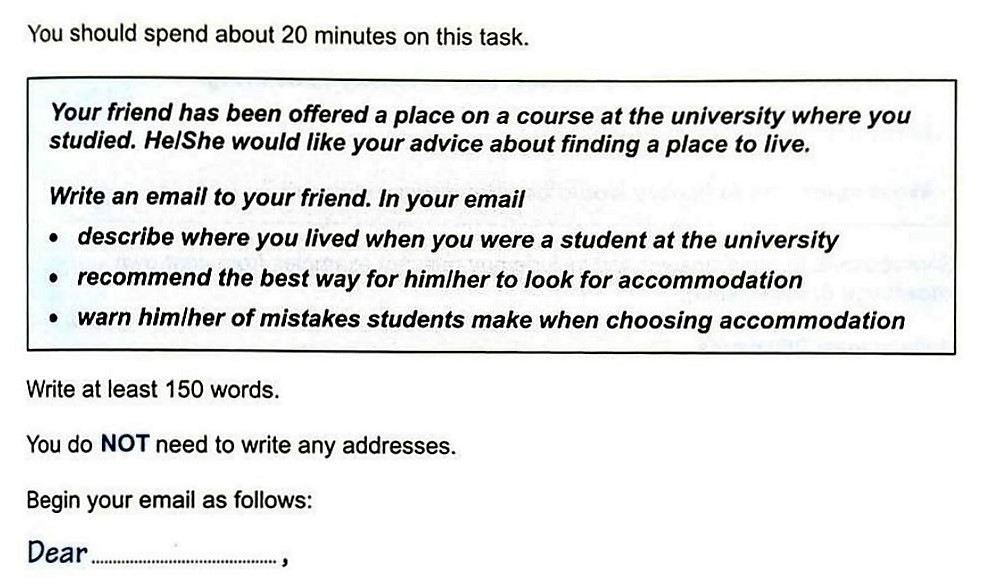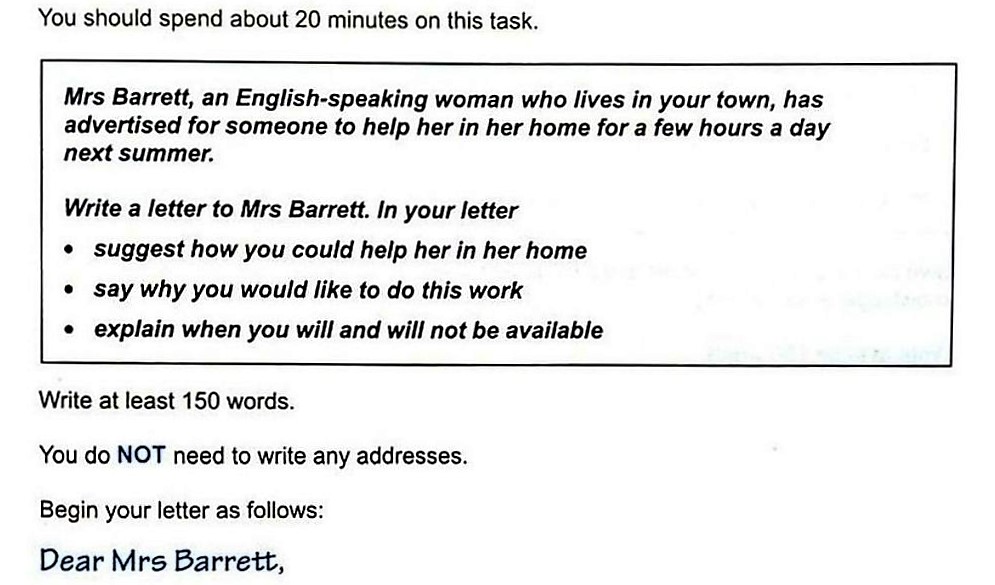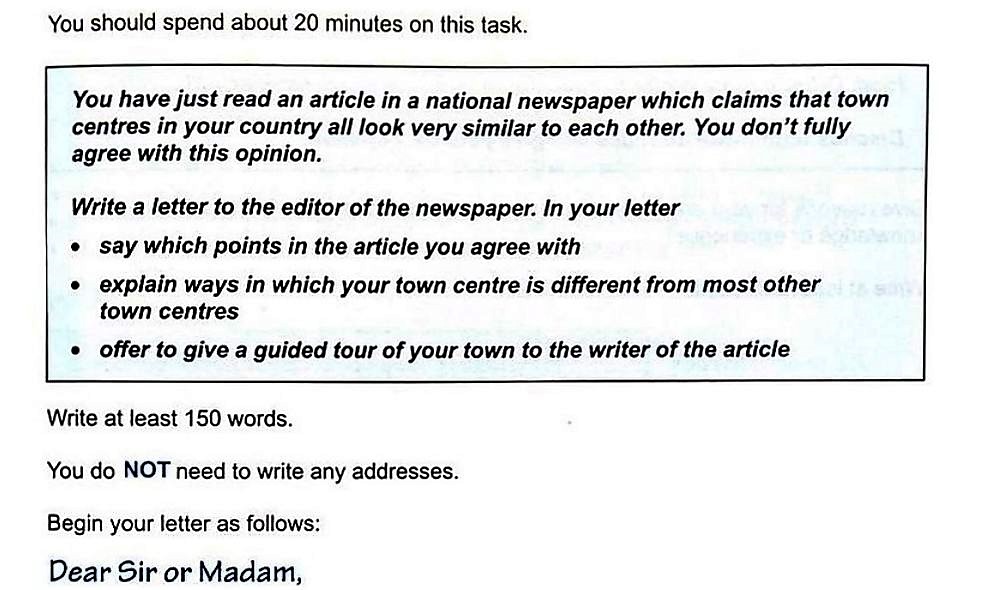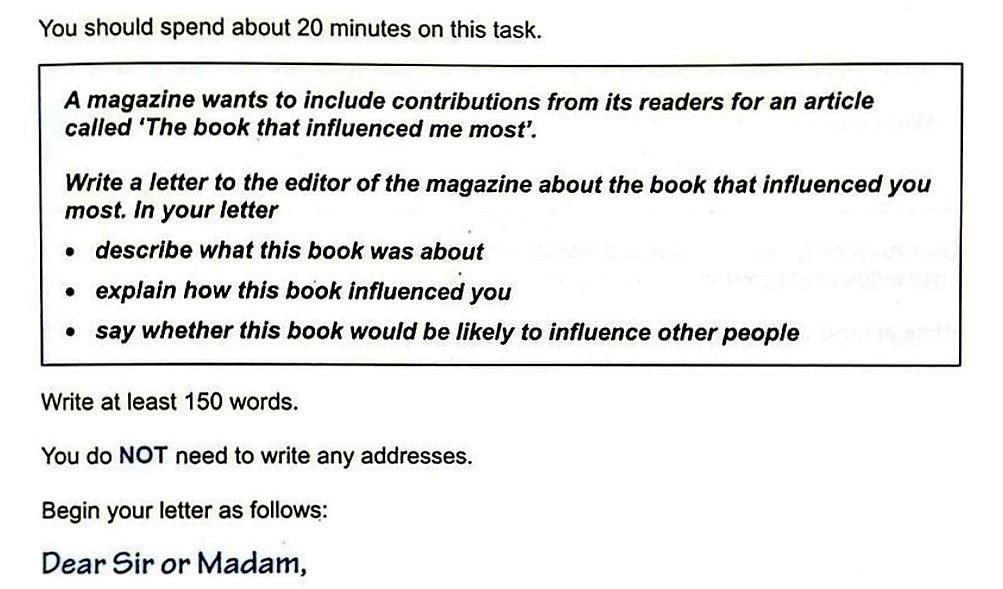IELTS General Writing TASK 1
In Writing Task 1, test takers are presented with a situation and required to write a personal response in the form of an informal, semi-formal or formal letter of at least 150 words in the answer booklet provided. Test takers should spend no more than 20 minutes on this task. The situations they are asked to write about are common, everyday ones such as: writing to a college accommodation officer about problems with accommodation, writing to a new employer about time management problems they are having, writing to a local newspaper about a plan to develop a local airport, writing to a renting agency to sort out problems with the heating system in their house.
IELTS General Writing TASK 1 Topics
Test takers are told what kind of information (in the form of three bullet points) they must include in their response. They may be required to request or give information and/or explain a situation. To do this, they may need to do some of the following: ask for and/or provide general factual information, express needs, wants, likes or dislikes, express opinions or complaints, make requests or make suggestions/recommendations.
IELTS General Writing TASK 1 writing styles
The style of writing that test takers use depends who they are asked to write to (i.e. the audience) and how well they are supposed to know them. They need to write in a style that is appropriate for their audience and that will help them to achieve their purpose for writing, e.g. writing to a friend (informal) or writing to a manager (semi-formal or formal). Test takers do not need to include any addresses at the head of their letters.
They are asked to write at least 150 words and will be penalised if their answer is too short. While test takers will not be penalised for writing more than 150 words, they should remember that a longer Task 1 answer may mean that they have less time to spend on Task 2, which contributes twice as much to the Writing band score.
Test takers should also note that they will be penalised for irrelevance, if the response is off-topic or is not written as full, connected text (e.g. using bullet points in any part of the response, or note form, etc.). They will be severely penalised for plagiarism (i.e. copying from another source).
Vocabulary to write letters
Letter structure
How to start and end the letter?
- Formal letter
When you don’t know the recipient’s name:
-
- Dear Sir … Yours faithfully
- Dear Madam … Yours faithfully
- Dear Sir or Madam … Yours faithfully
When the recipient’s name is known:
-
- Dear Mr Green … Yours sincerely
- Dear Mrs Green … Yours sincerely
- Dear Miss Green … Yours sincerely
- Dear Ms Green … Yours sincerely
- Semi-formal letter
When you are writing to a good friend or colleague:
-
- Dear Jonh … Best wishes/ Best regards
- Dear Jonh … Many thanks
- Informal letter
When you are writing to a good friend or colleague:
-
- Hello Jonh … Best wishes/ Best
- Hi Jonh … See you/ Missing you/ Love
When you are writing to someone you love:
-
- Dear Mary … Yours always/ Lots of love
Letter openings
The letter’s first paragraph is letter opening. In your first paragraph you should:
- introduce yourself
- state the purpose of the letter.
Examples of formal letter openings:
- I am writing to enquire about … .
- I am writing to request … .
- I am writing to explain why … .
- I am writing to express interest in … .
- I am writing to inform you that/about… .
- I am writing to complain about (the fact that I)… .
- After having seen your advertisement in … , I would like to… .
- After having received your address from … , I … .
- Thank you for your letter regarding/about … .
- In reply to your letter of 18 June, … .
Examples of informal letter openings:
- Hi! My name is Noah and I’ve been assigned your drama coach… .
- Hello, My name is Julia and I’m volunteer conducting student excursions… .
- Hi there, I hope you’re enjoying your holidays/ trip/ college year/ honeymoon… .
- Hello, thanks very much for asking me to visit you … .
Letter closings
You may need a letter closing to express gratitude, to repeat an apology, to offer help etc.
Examples of formal letter closings:
- If you require any further information, feel free to contact me.
- I look forward to your reply.
- I look forward to hearing from you.
- Once again, I apologise for any inconvenience.
- I would appreciate your immediate attention to this matter.
- I would deeply appreciate it if you could … .
- Thank you in advance!
- Thanking you for your assistance in advance, I look forward to hearing from you.
Examples of informal letter closings:
- Anyway, I‛ve got to go now. Write again if you need any more information.
- Well, let me finish here. I am eagerly waiting for your reply to this letter.




